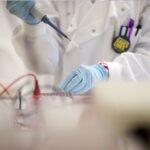Cancer biomarkers are core to our vision of delivering precision medicine for all. They are essential to predict and monitor tumour response to therapy, enabling more personal treatments that maximise benefit and reduce harm. Other uses of biomarkers include early detection of cancers, earlier warning of disease relapse after curative intent treatment, information to anticipate therapy resistance and for optimised treatment switching.
Cancer Biomarkers
The term ‘cancer biomarkers’ really implies a test in a sample from a patient that provides information to guide the best clinical management of that patient.
Biomarkers can be comprised of genetic material or protein(s), e.g, a mutation in a specific gene or genes, a level of a hormone or the presence of a type of an immune cell. Biomarkers can be measured in a variety of clinical specimen, including so called liquid biopsies e.g., in blood or urine, or in a biopsy of the tumour itself.

Biomarker Research in Manchester
Biomarker research is led from the Cancer Research UK Manchester Institute Cancer Biomarker Centre (CBC) a world-leading, and outstanding rated centre of excellence, directed by Prof. Caroline Dive CBE. Our biomarkers theme has strong cross over with the other research themes of the Manchester Centre, as well as strong interactions with The Christie NHS Trust and other infrastructure and organisations in Manchester.
The CBC has acknowledged expertise in liquid biopsy approaches, including analysis of circulating tumour cells (CTCs) and circulating tumour DNA (ctDNA) through laboratories run to Good Clinical Practice (GCP) standards that allow decision making regarding patient treatment in clinical trials. The preclinical research in the CBC is based predominantly on patient-derived mouse models – both Patient-derived Xenograft (PDX) and CTC-derived eXplant (CDX) which are used for therapy target validation and prediction of therapeutic responses.
The CBC’s work supports an extensive range of clinical and translational studies, including liquid biopsies for patient prognosis, optimal patient stratification and monitoring of treatment response and onset of resistance. This involves a number of specialist teams focussed on particular areas:
- Preclinical pharmacology Team
- Tissue Biomarkers Team
- Cell and proteins biomarkers Team, including the Tumour Immunology and Inflammation Laboratory
- Nucleic acid biomarkers Team
- Bioinformatics and biostatistics Team
- Digital Experimental Cancer Medicine Team to integrate biomarkers and clinical data
- Quality Assurance Team to advise on method validation and ensure compliance with Good Clinical Practice.
Over the coming years, the CBC has ambitions to expand the number biomarker-driven clinical trials. Our target is that all patients entering phase I trials will undergo biomarker evaluations (in tissue and/or ctDNA), and we will exploit the power of serial ctDNA analysis in experimental studies to monitor tumour evolution. By working with bioengineers and nanotechnologists within Manchester’s Graphene Institute, we are also looking to adopt innovative approaches to improve the sensitivity of ctDNA analysis. In addition, liquid biopsy approaches will increasingly be used for earlier diagnosis of cancer and the detection of residual disease, particularly in lung cancer.
Collaborations
Collaborations and partnerships are a vital component of CBC’s success. We interact across the entire CRUK Experimental Cancer Medicine Centre network and with many organisations across Cancer Research UK’s network of translational centres, particularly those without the resources to deliver biomarker-driven clinical trials. The CBC supports activities across ACED, RadNet and the CRUK Lung Cancer Centre of Excellence, as well as the Precision Medicine theme and Cancer Prevention and Early Detection themes of the NIHR Manchester BRC and typically supports up-to 50 concurrent clinical trials with biomarkers with clinical samples arriving each day from across the UK and from collaborators across the globe, both academic and with Pharma.
Navigation
Cancer Early Detection
To beat cancer sooner, we need to detect it sooner. Find out about our focus on early detection science
Digital Cancer Centre
Digital research underpins all our research themes. Discover how we leverage technology, AI and data to improve cancer outcomes.
Experimental Cancer Medicine
To improve patient lives, we need new therapies and treatments and early phase clinical trials to continue to be developed.
Integrative Pathology
Acquisition of patient samples is key to translational research and we have developed an extensive biobanking infrastructure to allow collection at all points of the treatment pathway.
Radiotherapy BioAdaption
Radiotherapy plays a vital role in the treatment of cancer and nearly 50% of people receive some form of radiotherapy at some point during cancer treatment.
Research
Navigate back to the Research homepage.






